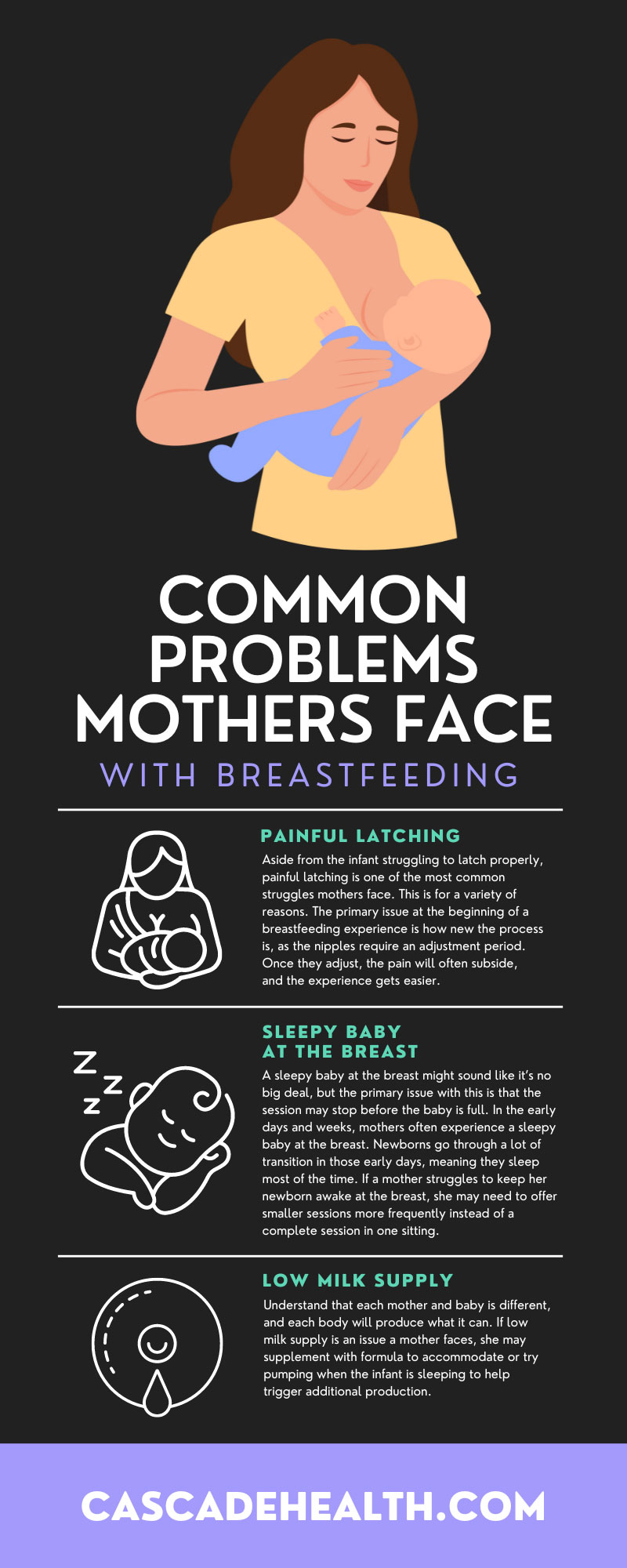10 Common Problems Mothers Face With Breastfeeding
Breastfeeding is an experience unlike any other. And for those who attempt it, they know that while breastfeeding is a natural, biological process, many things about breastfeeding hardly come naturally to each mother and baby. Mothers face many common problems with breastfeeding, from supply issues and latching struggles to bodily exhaustion. Fortunately, there are many solutions to each issue, and we discuss them below. With this guide, you’ll learn about common breastfeeding struggles and have the awareness to move the pedal forward toward long-term success and heightened community support efforts.
Poor Infant Latching Techniques
When infants learn to breastfeed during the sacred Golden Hour after delivery, they develop the necessary motor skills to maintain a proper latching technique. But sometimes, things outside of a provider’s or birth parent’s control can hinder this space and time. If an infant develops a poor latching technique, this can increase discomfort to the mother and reduce the infant’s ability to receive the right milk volume. Consulting an IBCLC is the best way to help the infant learn proper techniques and teach the nursing mother what to look for and how to correct flaws during a feed.
Painful Latching
Aside from the infant struggling to latch properly, painful latching is one of the most common struggles mothers face. This is for a variety of reasons. The primary issue at the beginning of a breastfeeding experience is how new the process is, as the nipples require an adjustment period. Once they adjust, the pain will often subside, and the experience gets easier.
Another common reason for painful latching is a strong letdown. Letdown is when the infant latches and triggers the milk flow down through the breast ducts. When a mother has a strong, forceful letdown, she may experience discomfort upon the latch. Notably, an intense letdown sensation is common and does fade the longer the session continues.
Sleepy Baby at the Breast
A sleepy baby at the breast might sound like it’s no big deal, but the primary issue with this is that the session may stop before the baby is full. In the early days and weeks, mothers often experience a sleepy baby at the breast. Newborns go through a lot of transition in those early days, meaning they sleep most of the time. If a mother struggles to keep her newborn awake at the breast, she may need to offer smaller sessions more frequently instead of a complete session in one sitting.
Scattering the feeds to ensure the newborn maintains nutrition levels can help empty the breast and keep the infant awake long enough to stay full. When the newborn can’t stay awake long enough for the mother to empty her breast, pumping the remaining milk to ensure she finds relief and avoids clogs is helpful.
Infant Struggles Without Explanation
Latching properly, staying awake long enough, and finding a good rhythm is hard work for a newborn. And just as this is difficult for the newborn, the mother can also struggle with how challenging the process is. Sometimes, struggles without explanations arise for various reasons, from hormonal to physical and everything in between. Struggling with breastfeeding and postpartum is normal, and support systems are available if this resonates.
However, in some cases, the struggles associated with breastfeeding can hinder mental well-being. The most appropriate solution would be to consider a different feeding method, such as bottle feeding, formula feeding, or pumping for a break and offering the breast another time.
Low Milk Supply
One of the most common problems mothers face with breastfeeding is a low milk supply. The breastfeeding market contains many support solutions, from lactation cookies, teas, and tonics, all claiming to help boost milk supplies. For some nursing mothers, these solutions work; for others, they don’t.
Understand that each mother and baby is different, and each body will produce what it can. If low milk supply is an issue a mother faces, she may supplement with formula to accommodate or try pumping when the infant is sleeping to help trigger additional production.
Cracked and Sore Nipples
Cracked and sore nipples occur in almost all breastfeeding experiences, typically around the beginning. The nipples will undergo an adjustment period where they will be at their worst, but investing in nipple creams and butters can make a significant difference. Another common solution is to apply expressed breastmilk to the surrounding areola, as the milk’s properties can help speed the healing process.
Engorgement or Overproduction
Engorgement or overproduction might not sound like an issue, especially when a low milk supply is the opposite. But overproduction can make it challenging for the mother to keep up and entirely empty their breasts, leading to engorgement, clogs, or eventually mastitis. Steadily moving the milk supply in and out of the breast is critical for long-term success and reduced discomfort.
Extreme Exhaustion and Bodily Fatigue
Breastfeeding means the mother is on demand, 24/7, regardless of their own schedule or needs. This makes breastfeeding incredibly exhausting. Mothers wake at all hours of the night, nurse at any point during the day, and remain stagnant the more their infant nurses.
This bodily fatigue and exhaustion can deplete mothers, causing them to forget to take proper care of themselves. Breastfeeding mothers must rely on a trusted support system when times get tough so they can take care of themselves.
Clogged Ducts or Mastitis
Clogged ducts and mastitis are common struggles for mothers. Sometimes, the mother can do everything right and still experience one of these issues. A clog often feels like a marble-sized knot nestled into the breast tissue and can be massaged down and out of the breast. The infant’s suckling technique is strong enough to pull the flow through the clogged ducts.
On the other hand, mastitis is an infection in the breasts and can occur when clogs go untreated or the mother becomes ill. A licensed medical professional must treat mastitis right away, and most often, a mother will need antibiotics to help treat the infection.
Decreased Self-Care Efforts
With an around-the-clock schedule, feeding on demand, and a hungry baby, mothers often fail to take proper care of themselves. Breastfeeding can be isolating because of the commitments necessary to sustain the relationship, and self-care frequently goes overlooked.
Leaning on a support system is vital. For instance, a friend or family member can offer the baby a bottle of pumped milk while the mother takes a breather, enjoys a hot shower, or squeezes in a nap.
Cascade Health Care offers a diverse selection of quality and ethical lactation supplies to support mothers, providers, and support systems. We value the commitment breastfeeding takes, and our inventory was hand selected to support all journeys, mothers, and babies for a successful and healthy experience. Shop with us today for optimal support!

Recent Posts
-
Ways Midwives Can Ensure a Safe Home Delivery
For professionals committed to providing exceptional care, ensuring a safe home delivery is at the h
-
When To Use Doppler Ultrasounds in High-Risk Pregnancies
Ensuring the well-being of both mother and fetus is the utmost priority in any pregnancy. This becom



